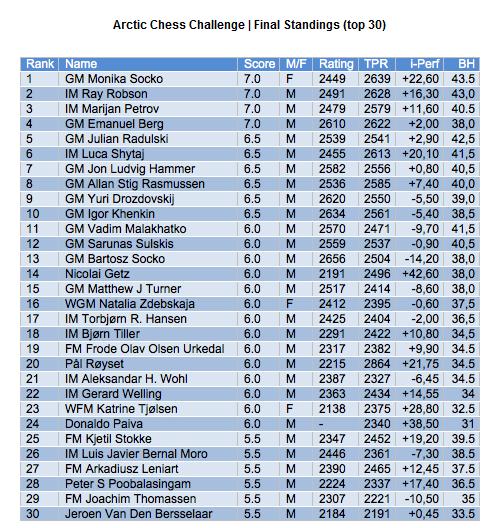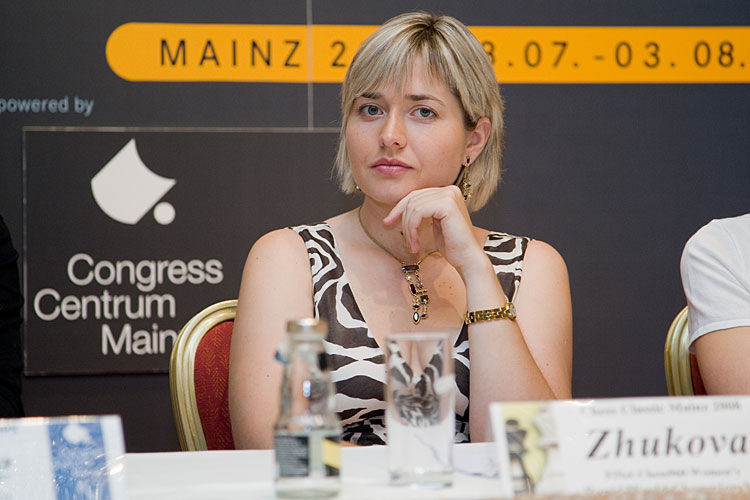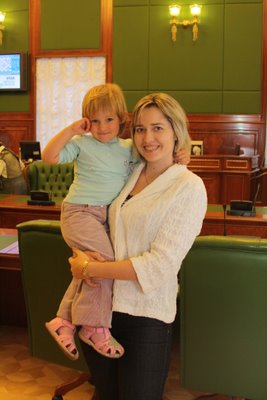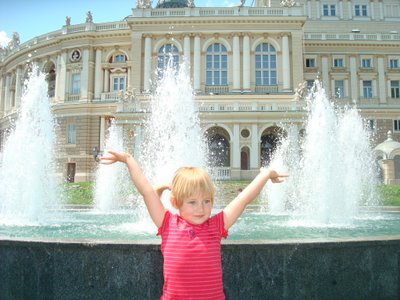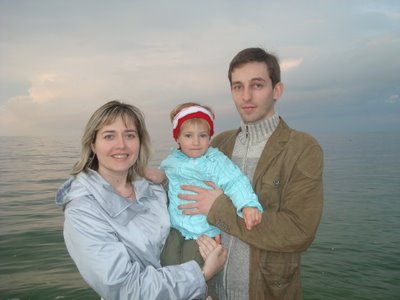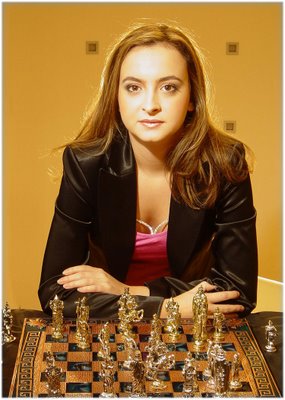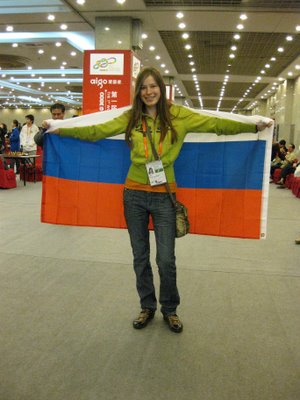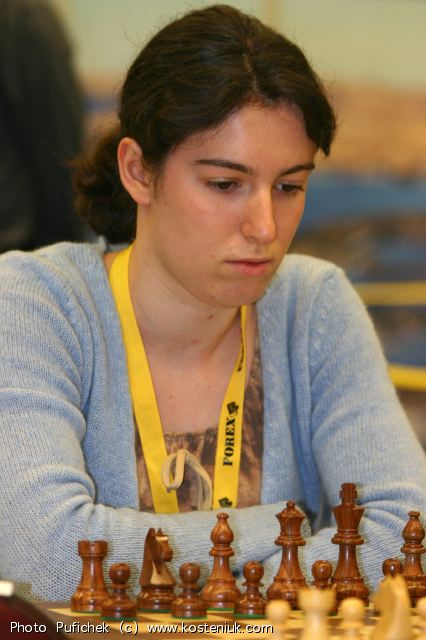
I'm glad to introduce today a very strong chess player and a very gifted young lady:
Yelena Dembo. Yelena has a very interesting story, she was born in Russia, later on moved to Israel, then lived in Hungary and eventually moved to Greece where she lives today. Yelena started to play chess as early as the age of 3 and competed in her first tournament when she was only 3 year and 9 months. When one say that there is not enough time in life for many things Yelena is proving otherwise. She's not only playing chess but also writing successful chess books. She has her own web-site -
www.yelenadembo.com and she wrote and published several chess books.
What is your place and date of birth?I was born in Penza (USSR) on the 8th of December 1983.
How did you start playing chess?I started playing at the age of 3 years and 3 months. I played in my first tournament among boys aged 8-12 when I was 3 years and 9 months old.
What are your main achievements in chess? I have 8 medals from the World and European championships, including the gold medal in the 2002 European Rapid Championship for girls under 20 in Novi Sad, Yugoslavia and, most significantly, the bronze medal in the European Women’s Championship 2005!
1st place in Hungarian women’s championship 2003 with 7,5 points out of 9 games.
I shared 1st place in the 2003 Acropolis WGM Tournament in Athens, Greece with a result of 6,5 out of 9!
My team won the silver medal in the 2003 European Women’s Team Championship in Plovdiv, Bulgaria where I played on the first board. My result was 6 out of 9!
I won the Bykova Memorial Tournament in Vladimir, Russia, in December 2004!
I won the bronze medal in the 2005 European Women’s Championship in Moldova!
I finished tied for 6th place in the very strong Hamburger Schachfestival, making a GM norm in the process with a performance of over 2600!
I tied for 3rd place in the 2006 European Women’s Championship in Turkey!
I tied for 3rd place in the 2007 Mediterranean Championships and won the Women’s title!
I tied for 2nd place in the 2008 European women’s Championship in Bulgaria.
I have more than 140 games published in the famous Yugoslav publication “Chess Informant” with my analysis and novelties. One can also find several of my games in the Encyclopaedia of Chess Openings.
What is your peak rating?2470 in 2007 (now it's 2469 :-) ).
How did you start writing chess books? It all started in 1992 when my parents who had their private chess & music academy in Tel-Aviv, Israel, started gathering middlegame examples for their collection :-) Around this time they also thought of the special “Dembo rules” which would help me and their students to develop better general chess understanding. Thanks to these rules and methods their students have won 30 gold medals in Israeli youth championships during eight years only! The level of juniors has risen incredibly quickly (so quickly that one of the students won the gold medal in the rapid world championship under 14). During a short time the children became more clever and more gifted. So, since I started teaching officially at the age of 13, this system was naturally very interesting for me. And already when I was 17 I had the idea to write a serious book about it. Therefore, when I became men’s IM (an objectively strong player) I started writing this book. The book was published in 2005. Then, so many people bought the book (including very strong GMs) that I started thinking about a new book! :-)
How many books have you already written? Five books have already been published and now I am finishing working on the sixth.
How long does it take to write a chess book for you? It depends on the subject of the book, on if I need to gather material, select it, analyse it. Usually it takes from 6 months to a year.
Why do you think there are not so many women who are writing chess books?I think it is more correct to say that there are only few women who write books :-) The reason is very simple – it is very difficult to write. It is necessary to understand the material very well, not to be afraid to let the world know about your opinion, to be able to prove this opinion, it is necessary to be a good writer, to explain the material very well, to know the language well, it is necessary to also be a quite high level player, etc.
Can you tell us more about your books? My first chess book, “
The Very Unusual Book About Chess”, is about the middlegame and contains several interesting methods of playing this part of the game, complemented by many instructive examples by the world’s leading players (Kasparov, Anand, Kramnik, Shirov, Sutovsky etc.) on each method. The book is available in English and Russian. It is 136 pages long and includes detailed verbal comments, special “Dembo-rules” and a very interesting and useful large chapter on gifted moves! I am sure that someone who studied this material will be able to find these gifted moves in his games as well!
My second book is titled “
Conversation with a Professional Trainer - Methods of Positional Play”. The book is 136 pages long. In my opinion, it is a very good manual of positional play. There are 232 examples in the book and I think they are all very interesting :-)
Here are the contents:
About The Author 5
Symbols & Abbreviations 6
The Purpose of this Book 7
Preface 8
Chapter One - Opening Problems 9
Chapter Two - How to Improve Part One 13
Chapter Three - How to Improve Part Two: Evaluation 25
Chapter Four - How to Improve Part Three: Choosing a Plan 82
Chapter Five - How to Improve Part Four: Recommendations - 104
Chapter Six - How to Improve Part Five 124
Index of Players 133
In late 2006 I have received an e-mail from Everyman Chess, the most significant chess publishing house of our times with compliments about my first two books and an offer to write for them. I gladly accepted!
The products of our cooperation so far:
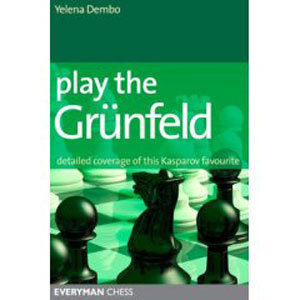 Play The Gruenfeld
Play The Gruenfeld was my first opening book, released in mid-2007! It provides a complete repertoire in the Gruenfeld Defence for the player with Black.
Next came
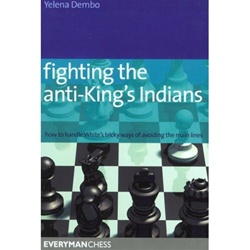 Fighting the Anti-King’s Indians
Fighting the Anti-King’s Indians: How to Handle White’s tricky ways of avoiding the main lines , which covers all of White’s possibilities after 1 d4 Nf6, with the exception of 2 c4, as well as advice and King’s Indian solutions to 1 Nf3 and 1 c4. The book was published in the second half of 2008.
My latest effort is a contribution of a few chapters in
Dangerous Weapons: The King’s Indian. Other contributing authors are GM
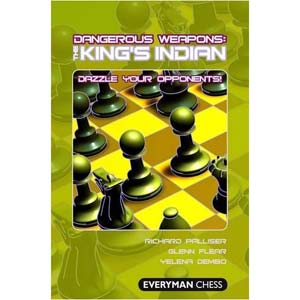
Glenn Flear and IM Richard Palliser. This book was published in early 2009.
Now I am finishing to write a guide book on the Scotch Game.
Do you consider yourself a professional chess player, chess trainer or chess journalist? I consider myself a professional chess-player, professional trainer, professional writer and professional chess-journalist!
How often do you study chess? How many hours a day? I try to study 4-6 hours every day but it depends on many things such as my tournaments, students, books, family.
Do you have a chess trainer or you study chess by yourself? My dad works with me since I was little. Many years ago he taught me and now I only use his advices. During some periods in my life I took lessons from others trainers but it didn’t influence me much.
What do you study most: openings, middle game or endgames? Naturally I try to divide my time in such proportions that I would study all chess :-) Especially, to study what I think I need at this time.
Do you prefer to play chess with men or with women? There are so few strong women’s events where I can play that I have no choice but to play in men’s events, especially since I want to fulfil the men’s GM title (I already have one norm).
Why do you think men are stronger than women in chess? You know, this question always surprises me, although I hear it all my life. It is possible to look at it from two sides.
First, in one reality most men (including chess-players) live for their careers. They usually deal only with their job. They do it for years, many hours each day and usually they don’t have any more problems :-) So how is it possible not to be a good specialist after such work :-)? They work all their life to have best results. Women have a totally different situation – they have to take care of the family, of the kids, food, laundry, ironing, cleaning of their apartment or a house (usually the wife does all the work in the house) and to be a professional player. So how can she have the same result as the man?
Secondly, I think that nature generally gifted men with more possibilities and I don’t see anything unusual or bad in it for women. Of course, there are many very good women violinists, pianists, etc. But generally it is not serious to compare men and women. It is better not to fight with nature! :-) And in chess it’s the same: you, me and many other players have many wins over GMs (and very strong GMs!) but I don’t think that women will be able to play like Kasparov, Fischer, Tal, etc.
When did you feel happiest about being a chess player? Why? It’s difficult to name just one. I can be very happy when I manage to play a very interesting game, win against a strong player, win a strong tournament, when people tell me that after reading my books they like chess much more. But maybe my happiest moment was 6 years ago when Sotiris Logothetis as an organizer invited me to play in the Acropolis tournament and in 6 months we got married :-).
If you had not become a chess player what career would you have chosen? I have never imagined anything else :-).
You were born in Russia, then moved to Israel, then played for Hungary and now you live in Greece. How many languages do you speak, and what country do you consider your home? I speak Russian, Hebrew, English fluently and understand and speak some Greek, Hungarian & Serbian. Naturally, I consider Greece as my home :-).
What is your favorite chess book? Fischer’s 60 memorable games.
What is your favorite non-chess book? “Master & Margarita” by Bulgakov.
What is the best game you have ever played? It’s difficult to name just one. I can name Castaneda-Dembo, 2003, Dembo-Driamin, 2000, Erenburg-Dembo, 2006, Kritz-Dembo, 2006.
What do you like doing besides playing chess? Sports – I like to jog, play table-tennis, sometimes I go to the gym. I love to read. I like different kinds of movies, from action to romantic and we often go with with my husband to the cinema to see the new ones! I also love to listen to music! Because my father is a professional pianist, I was listening to classical music, Italian, French, Russian, and many more songs from a very little age! Of course I also like Jazz, R&B, Soul, Pop, etc. I like to work in our gardens, we have plenty of flowers and trees!
Do you believe in the future of women’s chess? Not really :-) See question about why men are stronger than women in chess :-).
What is the best chess country in the world? I think it is very difficult to name the leader. Many years ago it was USSR, now there are some such countries, for example, India, China, Russia, France, Germany & Hungary.
What is the best organized women’s tournament you took part in? Acropolis 2003 and all the years after :-)
What is your dream in chess? To raise my chess-level, my elo and to try to become a men’s GM.
What is your favorite chess piece? The Queen.
What is your favorite place in the world? The top of the Eiffel tower.
What is your favorite kind of food? Pancakes with caviar :-).
What are your future plans for this year? Rethymnon open in Crete, Acropolis Open, Mediterranian championship in Rijeka, Women’s Romanian league, Women’s European team championship in Novi-Sad.
Posted by: Alexandra Kosteniuk
Women's World Chess Champion
www.chessblog.comLabels: chess books, Woman Chess Star, Yelena Dembo
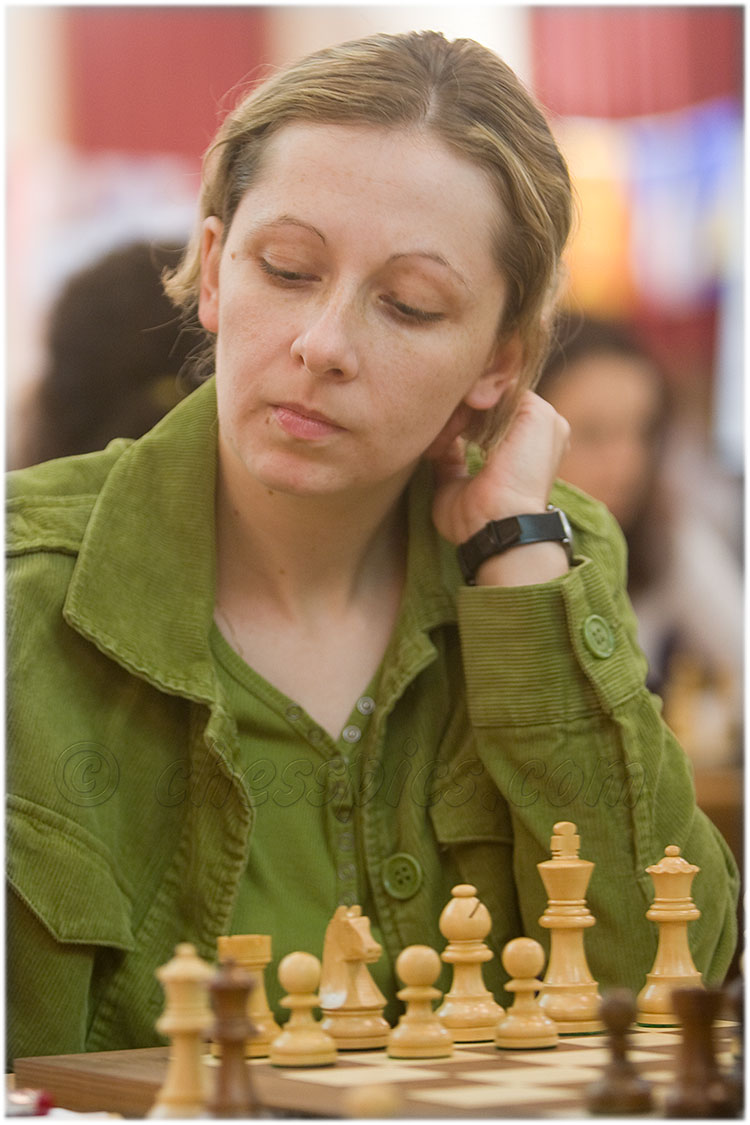 will be capable of taking care of 3 children, of a spouse, of the house and at the same time will be able to become a GM, to play strong and exciting chess and sometimes win chess tournaments. If you will find such man, please let me know, but I doubt there is one. At the same time, I can name you one woman who is not only doing all the things that I wrote above, but who also is a great and very kind person who is always ready to help.
will be capable of taking care of 3 children, of a spouse, of the house and at the same time will be able to become a GM, to play strong and exciting chess and sometimes win chess tournaments. If you will find such man, please let me know, but I doubt there is one. At the same time, I can name you one woman who is not only doing all the things that I wrote above, but who also is a great and very kind person who is always ready to help.